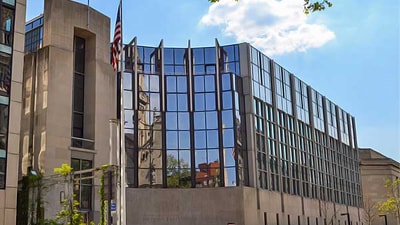CMU’s Software Engineering Institute Contract Renewed by Department of Defense for $1.73 Billion
By Richard Lynch / 412-268-4793 / public-relations@sei.cmu.eduThe U.S. Department of Defense has renewed its contract with Carnegie Mellon University for the Software Engineering Institute. The contract ensures that the institute, a federally funded research and development center, will continue to support the nation’s defense by advancing and transitioning the science, technologies, and practices needed to engineer and secure software systems.
The SEI, which is sponsored by the Office of the Under Secretary of Defense for Acquisition, Technology, and Logistics, is the only FFRDC focusing specifically on software-related security and engineering issues. The contract was awarded for a term of five years with an option for an additional five years. The contract has an overall ceiling of $1.73 billion.

The SEI is the only federally funded research and development center focusing specifically on software-related security and engineering issues.
“It is an honor for CMU to be selected to manage the government’s research and development center for software engineering and cybersecurity at such a critical time for this work,” Carnegie Mellon President Subra Suresh said. “CMU’s expertise in securing systems and combatting cyberattacks is a university-wide strength across SEI and various academic units, and this work is becoming increasingly important not only for national defense but also for individual citizens, critical infrastructure and commercial enterprises.”
“The collaboration between CMU and the SEI provides tremendous benefits to both the university and the institute, making possible accomplishments neither could realize on its own,” said CMU Provost Farnam Jahanian. “Together, CMU and the SEI will support the missions of our nation’s defense and civilian agencies and collaborate with industry partners to advance and transition innovative technologies.”
“Our new contract guarantees that the SEI can continue to develop breakthrough technologies in collaboration with Carnegie Mellon University, the Department of Defense and our industry partners.” — SEI Director and CEO Paul Nielsen
Complex software systems requiring the highest levels of cybersecurity now underpin the operations of the DoD, the Department of Homeland Security, and other government agencies and industries in a software-dependent society. As part of Carnegie Mellon, one of the world’s leading academic institutions for research and education in computer science and engineering, the SEI is uniquely positioned to develop technologies and practices through its own research and to apply innovative technologies developed by outside organizations to solve difficult engineering and cybersecurity challenges in various fields, including aerospace, transportation, banking and finance, energy, robotics and industrial automation.
“The renewal of our contract is a strong endorsement of the value the SEI’s women and men provide at a time when cybersecurity and software quality are critical to our national security,” said Paul Nielsen, SEI director and CEO. “Our new contract guarantees that the SEI can continue to develop breakthrough technologies in collaboration with Carnegie Mellon University, the Department of Defense and our industry partners. It also ensures that hundreds of excellent technology jobs remain in Pittsburgh for the foreseeable future, and that the SEI will continue to be a high-tech anchor for the region.”
FFRDCs are unique nonprofit entities sponsored and funded by the U.S. government that address long-term problems of considerable complexity, analyze technical questions with a high degree of objectivity, and provide creative and cost-effective solutions to government problems.
The SEI was established in 1984. Throughout its history, the SEI has pursued research, development and demonstration, collaboration, and transition objectives that address pervasive and significant problems that impede the ability of organizations to acquire, develop, operate, and sustain software systems that are innovative, affordable, trustworthy and enduring.